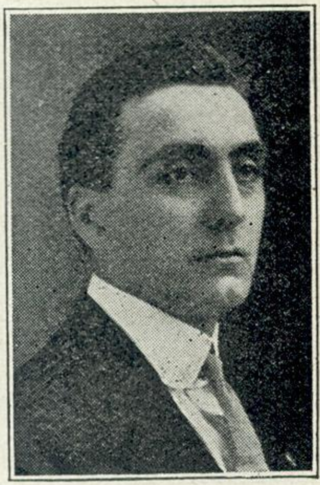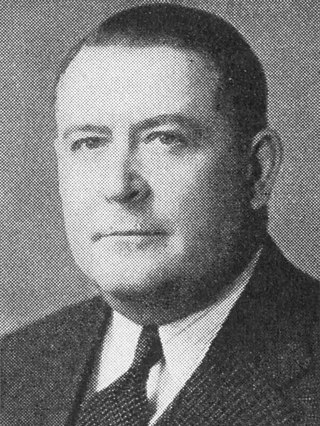Related Research Articles

The Territory of Wisconsin was an organized and incorporated territory of the United States that existed from July 3, 1836, until May 29, 1848, when an eastern portion of the territory was admitted to the Union as the State of Wisconsin. Belmont was initially chosen as the capital of the territory. In 1837, the territorial legislature met in Burlington, just north of the Skunk River on the Mississippi, which became part of the Iowa Territory in 1838. In that year, 1838, the territorial capital of Wisconsin was moved to Madison.

Frederick RobertZimmerman was a German American politician from Milwaukee, who served as the 25th Governor of Wisconsin. He served before and after his governorship as Wisconsin Secretary of State—for a total of eighteen years in that office. He also served one term in the Wisconsin State Assembly. His son, Robert C. Zimmerman, was also Wisconsin Secretary of State from 1957 until 1975.
Butler Gilbert Noble was the seventh Lieutenant Governor of Wisconsin under Governor Alexander Randall.

Samuel S. Fifield was a Wisconsin politician and influential businessperson. The Town of Fifield in Price County, Wisconsin is named after him.

The First Wisconsin Legislature convened from June 5, 1848, to August 21, 1848, in regular session. Members of the Assembly and Senate were elected after an election on February 1, 1848, that ratified the proposed state constitution.
Julius Kiesner was an American tire vulcanizer from Milwaukee who served five terms (1919–1928) as a Socialist member of the Wisconsin State Assembly representing Milwaukee's 9th Assembly district.
Otto A. Kehrein was an American carpenter from Milwaukee who served two terms (1929–1932) as a Socialist member of the Wisconsin State Assembly representing the 9th district of Milwaukee County, and also served on the Milwaukee County Board of Supervisors.

Herman O. Kent was a farmhand, typesetter and trade union activist from Milwaukee, Wisconsin who served two terms as a Socialist member of the Wisconsin State Assembly representing Milwaukee County's 9th Assembly district.

George L. Tews was a machinist, businessman and real estate broker from Milwaukee, Wisconsin, who served three non-continuous terms as a Socialist member of the Wisconsin State Assembly.
Ninian Edward Whiteside was an American Democratic politician, attorney, and pioneer who served as the 1st Speaker of the Wisconsin State Assembly and 9th Speaker of the California State Assembly. Whiteside is believed to be the only person to serve as the Speaker of the House in two separate state legislatures in the United States.
George W. Wolff was a member of the Wisconsin State Assembly (1895–1897) and the Wisconsin State Senate (1901–1907).

Alexander Lee Nicol was an American political figure on the state level who served as Speaker of the Wisconsin State Assembly during its 1949–50 session.
Otis Colwell was an American merchant and politician in the early years of the U.S. state of Wisconsin. He was a member of the Wisconsin State Assembly for the 1849 session, representing the village of Southport and southeast Racine County.
Horace Nelson Chapman was an American lawyer, politician, and Wisconsin pioneer. He served one term in the Wisconsin State Assembly, representing the city of Racine as a member of the Free Soil Party during the 1850 session.
Erastus G. Smith (1855-1937) was a member of the Wisconsin State Assembly and Dean of Beloit College.

The 1848 Wisconsin gubernatorial election was held on May 8, 1848. This was the election for the first Governor of Wisconsin, which became a U.S. state that year, as it was held concurrent with a public referendum to ratify the Constitution of Wisconsin.

The 1849 Wisconsin gubernatorial election was held on November 6, 1849. Democrat Nelson Dewey won the election with 52% of the vote, winning his second term as Governor of Wisconsin. Dewey defeated Whig Party candidate Alexander L. Collins and Free Soil Party candidate Warren Chase.
The Thirteenth Wisconsin Legislature convened from January 11, 1860, to April 2, 1860, in regular session.
Henry Johnson was an American farmer, Republican politician, and Wisconsin pioneer. He was instrumental in the founding of the Wisconsin State Agricultural Society, and served two terms in the Wisconsin State Assembly, representing eastern Kenosha County. Earlier in his life, he was a member of the New York State Legislature.
George W. Brown was an American farmer from Brookfield Center, Wisconsin who served a single one-year term as a Democratic member of the Wisconsin State Assembly in 1862.
References
- ↑ "Those Who Served: Wisconsin Legislators 1848 - 2007" (PDF). Wisconsin Blue Book 2007 - 2008. p. 140. Retrieved 2015-09-23.